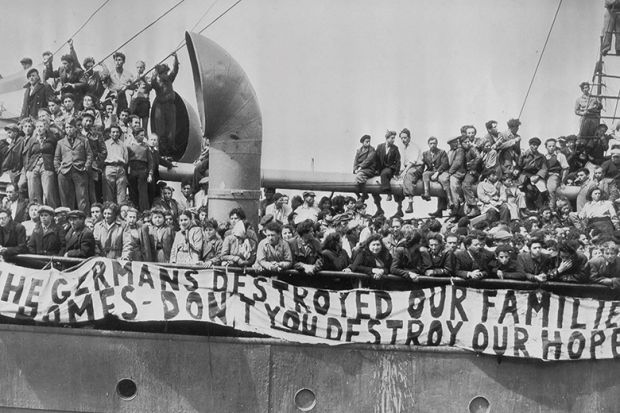In 1939, Marta Hertz, a young Jewish refugee employed as a domestic helper in north Manchester, wrote a letter to her mother back in Germany. She complained of the house that “for our German taste is furnished in quite a horrible fashion, lots of nick-knacks, artificial flowers…awful red carpet on the floor”. She continued, sardonically, that her charge, the son, “would come out of his room, stark naked, jump on us [and] start spitting into our faces”.
This host family, which Tony Kushner describes as an “early Jewish Mancunian version of the ‘Addams Family’”, was one of many British households that took in young Jewish women, partly as refugees, partly as employees, to meet care and household needs before, during and after the Second World War. Some of these women were satisfied with their work, others felt humiliated professionally, culturally and, occasionally, sexually. Some elected to engage in prostitution over domestic work, much to the chagrin of the established British Jewish elite.
In this fascinating book, Kushner, professor of history at the University of Southampton, explores some of the lesser-told stories of migration from the 1880s onwards, focusing upon the experiences of women and children, and mainly upon immigration into the UK. The book covers groups such as Serbian children in the 1920s and draws out some of the parallels with today. Yet its central focus is on the experiences of Jews before, during and after the Holocaust.
Domestic workers were the single largest category of asylum seekers entering England in the pre-war period, but their plight has received little attention. In contrast, a hagiography has grown up around British support for the 10,000 children who arrived on the Kindertransport. According to Kushner, this is because the motives of the British government and individuals in assisting the entry of domestic workers were less noble. As the assistant secretary of the Home Office, A. J. Eagleston, put it in 1941, these women were admitted “for the simple reason that there has long been a shortage of British servants and aliens therefore [are] welcome in this occupation”. Through his analysis of these less familiar narratives of asylum that sit awkwardly between the legal categories of refugee and migrant worker, Kushner paints a complex picture of the British government’s attitudes during the war.
This is a history from below: from under the stairs, from the kitchens, from the orphanages and from the brothels of a war‑torn Britain, and it is a fascinating one. Since Kushner is not telling a grand top-down history but a personalised, social one, he employs unusual sources – letters, biographies, plays, memoirs, recordings and individual case files – to make his points. Even famous films are invoked, and critiqued. James Ivory’s The Remains of the Day (1993) is included, for example, for at its margins are two Jewish refugee maids who are fired by their anti-Semitic employer, Lord Darlington, when he discovers their ethnic background, despite loyal service to his estate. Unlike traditional cultural portrayals in which Jewish women refugees are the objects of racist behaviour by protagonists, Kushner’s book makes them its central characters. And he acquires similar hidden, first-hand stories from children, who have been treated as mere objects in Holocaust studies and given limited agency for too long.
Everyday acts of rebellion are documented. Once migrated, some domestic workers turned up their noses at their employers, through refusal to be demeaned into wearing a “maid’s hat” or the establishment of sisterhood associations such as the Hampstead Club of the Austrian Domestic Worker, which published satirical pamphlets about their experiences. Child survivors proved adept at navigating complex bureaucratic rules and exiting war-torn Europe, some choosing undocumented passage to Palestine over approved entry into Britain. The 300 orphans who were airlifted in 1945 and 1946 by the British government from the Theresienstadt ghetto to the Lake District assimilated into Englishness through their pride in local cricket, but also maintained their Bundist (Eastern European socialist) politics and their Yiddish connections. While these airlifts were intended to have a redemptive quality, some child refugees were not “saved” and became hardened criminals, against the hopes of their British sponsors.
Class is also central to this book. There is the frustration of educated middle-class women forced into domestic work as the only viable passage out of persecution. There is also the fascinating class divide among Jews, such as that between the established communities and the recently arrived, destitute Ostjuden (Eastern Jews), who were viewed in some circles as wretched and rootless, forever psychologically damaged by the war.
The mechanics of the migration journey are another important aspect of the book. Surprisingly, given the importance of travel in asylum seeking, the variety of journeys has formed a small part of the historical Holocaust narrative to date. In particular, the deployment of borders by governments – land-based, on the high seas or through legal classifications – as a mechanism for exclusion of refugees and asylum seekers is a key theme of the book. Kushner revisits famous cases of boats turned back, such as the SS Exodus in 1947 – when a ship filled with Jews was returned from Palestine to Germany – tracing events from both a personal and international relations perspective.
On all these topics, the book is very strong and its fresh material is communicated in a highly engaging style. It also identifies the commonalities between the experiences of Holocaust survivors and current refugees, thereby rejecting a simplistic binary between earlier flows of people as independent and legal and more recent ones as mendicant and illegal. The point is well taken and, in setting these historical events against contemporary occurrences, Kushner’s intention is to demonstrate the commonalities in the experiences of all refugees. For instance, there are startling parallels between the story of the SS Exodus and the Tampa incident in 2001, when 400 mainly Hazara asylum seekers were refused entry into Australian maritime waters. Kushner points to overlaps between some of The Sun’s characterisations of asylum seekers as “cockroaches” and anti-Semitic Nazi propaganda. Yet these briefer descriptions of recent crises that bookend the analysis of the Holocaust in some respects distract from the richness of the historical material.
Of more interest is the discussion of the ways that some survivors of Nazi persecution have sought to differentiate themselves from later asylum flows through underplaying the illegality of their own migration and a strong focus on their self-reliance. Kushner delicately points to the support that these Jewish refugees did receive and the sometimes illegal nature of their migratory pathways into Britain. He also cites the British novelist Hanif Kureishi, who wrote that: “The recently arrived immigrant, the last through the door…can himself be disgusted by the idea of the newer arrival.” In an era when borders are being tightened and far-Right parties are insurgent, it is important to think about the role that those of migrant background themselves play in these harmful differentiations between and across migrant groups – and to consider the ways in which, through historical reflection, we may counteract such portrayals.
Anna Boucher is a senior lecturer in political science at the University of Sydney and is currently writing a book about the Holocaust.
Journeys from the Abyss: The Holocaust and forced migration from the 1880s to the present
By Tony Kushner
Liverpool University Press
360pp, £24.95
ISBN 9781786940636
Published 28 September 2017
The author

Tony Kushner, the Marcus Sieff professor of the history of Jewish/non-Jewish relations at the University of Southampton, was born in Manchester in 1960. As his mother was a disabled widow and one of his brothers deaf-blind, he recalls, “dealing with difference was part of my family upbringing. Manchester has always been a city of migrants, and as of third-generation East European Jewish origin, I very much felt part of it.”
Pursuing a degree in economic and particularly social history at the University of Sheffield reflected Kushner’s desire “to study the lives of ordinary people and not just the great and the good. On top of this…Sheffield was the only place where you could study migrant (and anti-migrant) history.”
After an MA at the University of Connecticut, Kushner returned to Sheffield for a PhD on British Jewish history. More recently, he has focused on refugee history and, since moving to the University of Southampton in 1986 to develop the Parkes Institute for the Study of Jewish/non-Jewish relations, issues of memory.
He says that he had “always wanted the history I studied (and then researched and wrote about) to have an ethical element…I am strongly of the view that historians can be committed to their subject area without losing their authority…I have always found working with current-day activists stimulating to them and to myself.”
As for the links between past and present, Kushner believes “We can understand some of the ‘classic’ refugee movements with greater complexity if we consider what is happening today. Perhaps one of the most important ‘political’ messages is that the attempt to divide ‘deserving refugees’ from ‘undeserving migrants/aliens’ has been happening for well over a century. Such distinctions are always in the eye of the beholder, and it seems that the only truly ‘good’ refugees are those in the past.”
Matthew Reisz
POSTSCRIPT:
Print headline: The refugees under the stairs
Register to continue
Why register?
- Registration is free and only takes a moment
- Once registered, you can read 3 articles a month
- Sign up for our newsletter
Subscribe
Or subscribe for unlimited access to:
- Unlimited access to news, views, insights & reviews
- Digital editions
- Digital access to THE’s university and college rankings analysis
Already registered or a current subscriber? Login











